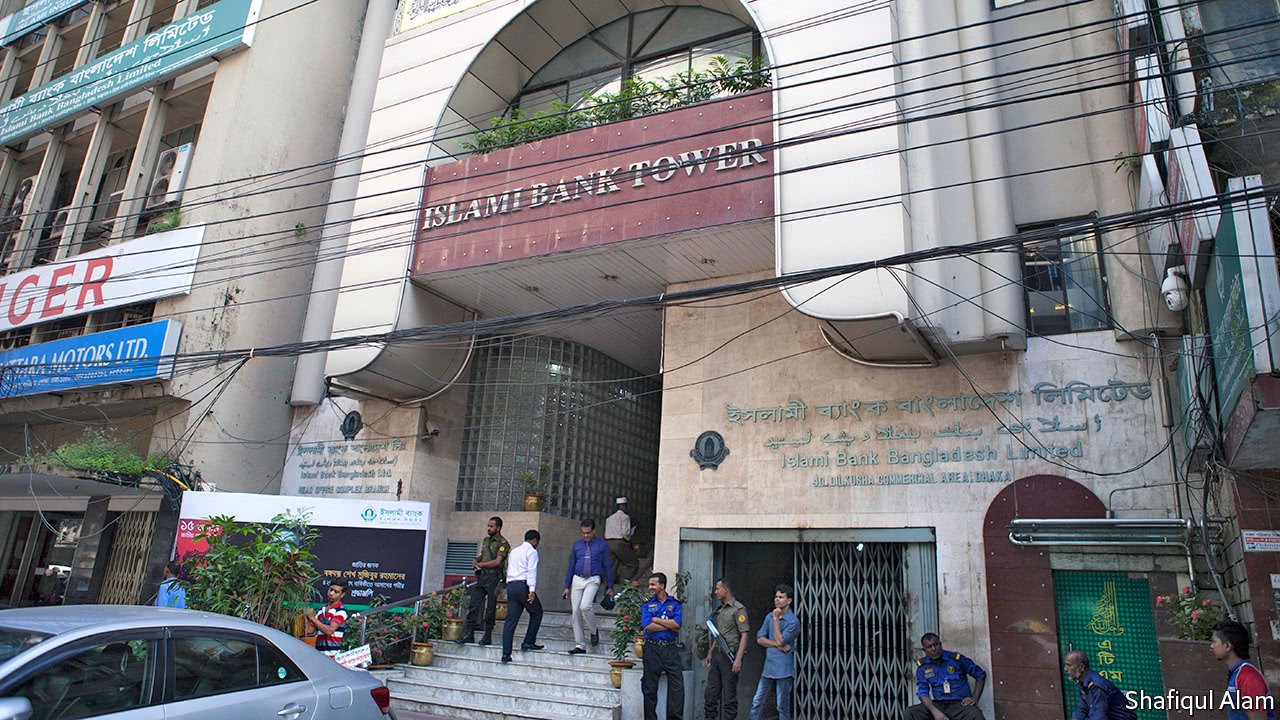
IN MOTIJHEEL, the main business district in Bangladesh’s capital, Dhaka, an iron fence and terrible traffic divide two branches of the country’s oldest private bank—a “conventional” one and an Islamic one. Abdus Sattar, manager of the Islamic one, says that when he joined AB Bank, in 2005, his was “a loser branch”. Today, like most Islamic banks in the country, it is more profitable and better run than its conventional peers. Islamic banking’s future in the country, however, remains murky.
Bangladesh has eight full-fledged Islamic banks; a handful of orthodox banks, like AB, also offer Islamic-banking services alongside others. Islami Bank Bangladesh, founded in 1983 by Saudi and Kuwaiti investors, commands 90% of Islamic-banking assets and deposits. It is also the biggest private lender overall, with 14,000 staff, 12m depositors and a balance-sheet of $10bn. Its success was built on the “two Rs”: remittances and ready-made garments. Islami Bank was a pioneer in financing Bangladesh’s rise as the apparel industry’s main production base outside China. It also runs the world’s biggest Islamic microfinance scheme.
-
Migration to Britain is falling
-
Retail sales, producer prices, wages and exchange rates
-
How America botches executions using lethal injections
-
How hip-hop is introducing children to coding and technology
-
Foreign reserves
-
Why Roger Taney’s statue was removed from Maryland’s state house
Azizul Huq, a former vice-chairman of Islami Bank, thinks sharia-compliant banking will eventually outgrow the conventional kind (at present it controls just 20% of deposits). The population of 170m is 90% Muslim. The World Bank reports that only one in three Bangladeshis has a bank account. The government’s own polls show that Islamic banking is wildly popular, especially in the cities and among the young. Overall, 84% “approve” of it.
Ahsan Mansur, the executive director of Policy Research Institute (PRI), a think-tank in Dhaka, says Islami was the only bank where “bribery was not institutionalised”. At conventional banks bad loans to politically connected businesses have been piling up. Politicians seem to be encouraging nepotism: a new banking law will allow directors to stay on boards for nine years (up from six); and allow controlling families four members (up from two).
This month the central bank reported that net profits at conventional banks rose by just 4.9% over the year to June. Non-performing loans (NPLs) stood at 9.2%, compared with just 4.3% at Islamic ones. At nine of the country’s 57 banks, over 20% of loans were non-performing. The bad-loan problem may yet worsen as business struggles with stagnant exports: in the 12 months to June, garment exports expanded by 1.7% year on year, the slowest pace in 15 years. The central bank’s stress tests show that if the three biggest borrowers defaulted, 23 banks would fail.
In this context, Islamic banking might expect some official help. Far from it. The central bank has been sitting for years on applications from eight banks to change to an Islamic business model. It is yet to write rules for new sharia-compliant financial instruments, such as a sovereign sukuk, or Islamic bond. Islamic banks have no role in financing government projects.
Resistance comes from both the financial and political establishments. The central bank adheres to economic orthodoxy and is wary of a form of banking in which interest rates are nominally abolished. And the government of Sheikh Hasina, the prime minister, has long identified Islamic banking with the political opposition.
In January the government in effect instigated a boardroom coup at Islami Bank, which had been run by members of the biggest Islamic party. Ownership is now in the hands of those close to the prime minister’s family. This, too, may stunt Islamic banking. Bangladesh’s biggest successes —garments, microfinance and telecoms—are in industries where the government took a back seat. Since the takeover, the bank’s biggest institutional investor, the Jeddah-based Islamic Development Bank, has reduced its stake from 7.5% to 2.1%.
Mr Mansur of PRI notes that the takeover “clearly signals that assets in Bangladesh may not be safe in the future”. Islami Bank’s chairman, Arastoo Khan, insists it will bounce back, despite a record low 10% dividend in 2016 compared with a historic average of 21%, and rising NPLs. The future of Islamic banking in Bangladesh may hinge on whether he is right.
Source: economist
Islamic banking grows in Bangladesh, no thanks to the authorities